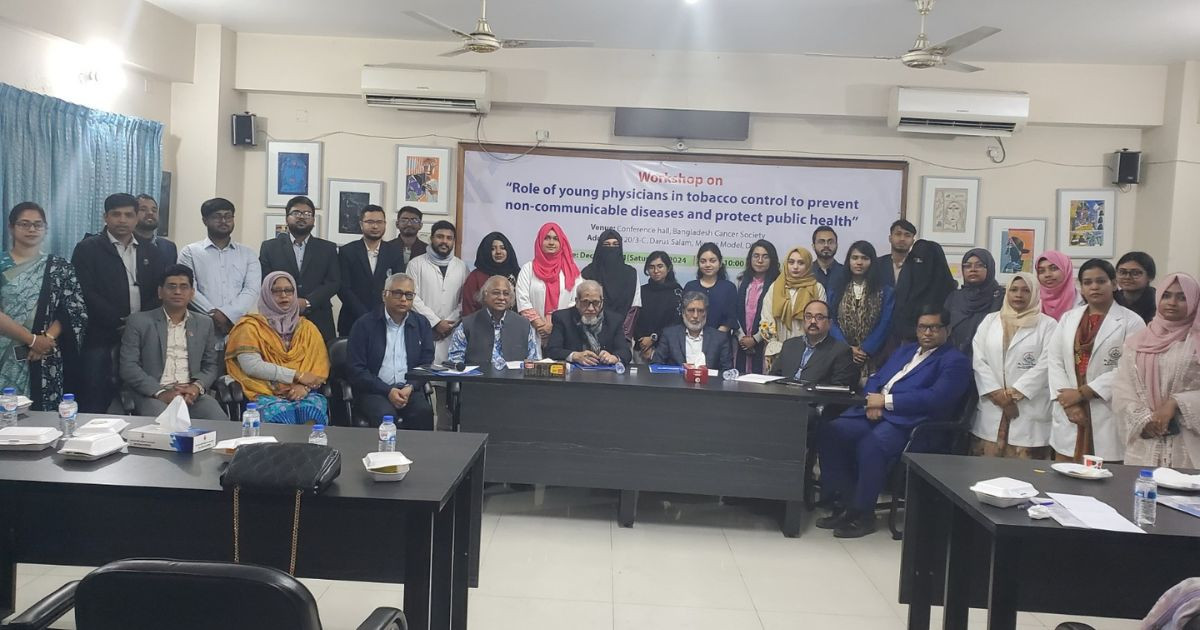Young doctors urge quick amendment to tobacco control law for public health
Daily Sun Report, Dhaka
Published: 21 Dec 2024

Photo: Courtesy
Young doctors have identified six weaknesses in the existing Smoking and Tobacco Products Usage (Control) Act, 2005 (amended in 2013), and demanded that these provisions be aligned with the World Health Organisation’s Framework Convention on Tobacco Control (FCTC).
The proposed amendments include: prohibiting designated smoking areas (DSAs) in all public places and public transport; banning the display of tobacco products at points of sale; completely banning tobacco companies from engaging in corporate social responsibility (CSR) activities; banning all emerging tobacco products, including e-cigarettes; increasing the size of pictorial health warnings on tobacco product packaging from 50% to 90%; and prohibiting the sale of single stick cigarettes, open packs, and unwrapped smokeless tobacco products.
The call was made at a day-long workshop titled "Role of young physicians in tobacco control to prevent non-communicable diseases and protect public health" held at the auditorium of the Bangladesh Cancer Society on Saturday.
The National Heart Foundation of Bangladesh and the Bangladesh Cancer Society jointly organised the event presided over by Prof Dr Md Abdul Hai, director of Bangladesh Cancer Society Hospital and Welfare Home.
Presenting the keynote address, Prof Dr Golam Mohiuddin Faruq, president of the Bangladesh Cancer Society said that tobacco use leads to 161,000 premature deaths annually in Bangladesh.
“This number will continue to grow unless the existing Tobacco Control Act is amended promptly. Without this amendment, it will not be possible to prevent these premature deaths,” he warned.
Prof Dr Sohel Reza Choudhury, head of the Epidemiology and Research Department at the National Heart Foundation Hospital and Research Institute, discussed the harmful effects of e-cigarettes.
He emphasised that e-cigarettes pose severe health risks, such as heart attacks, strokes, and lung damage.
He added, “Recognising the dangers, 42 countries have already banned e-cigarettes entirely. Recently, Belgium, an EU member state, announced a ban on disposable vape sales starting January next year, primarily due to their appeal to children and environmental harm. Similarly, our country needs to amend its Tobacco Control Act immediately to protect our youths from emerging tobacco products like vaping and e-cigarettes.”
Md Ataur Rahman, advocacy manager of Campaign for Tobacco-Free Kids, Bangladesh, highlighted the deceptive tactics of tobacco companies.
He said, “Tobacco companies promote cigarettes through initiatives like Battle of Minds, which target university students under the guise of job opportunities. They also set up designated smoking areas (DSA) in restaurants to make it easier for young people to develop an addiction to tobacco products. To counter these tactics, it is essential to prohibit corporate social responsibility (CSR) initiatives and the display of tobacco products at points of sale.”
The event was attended by Sharf Uddin Ahmed Chowdhury, adviser to the Tobacco Control Program at the National Heart Foundation Hospital and Research Institute and divisional commissioner of Dhaka, along with Md Mostafizur Rahman, lead policy advisor of Campaign for Tobacco-Free Kids, Bangladesh, and medical students from various institutions across the country.

